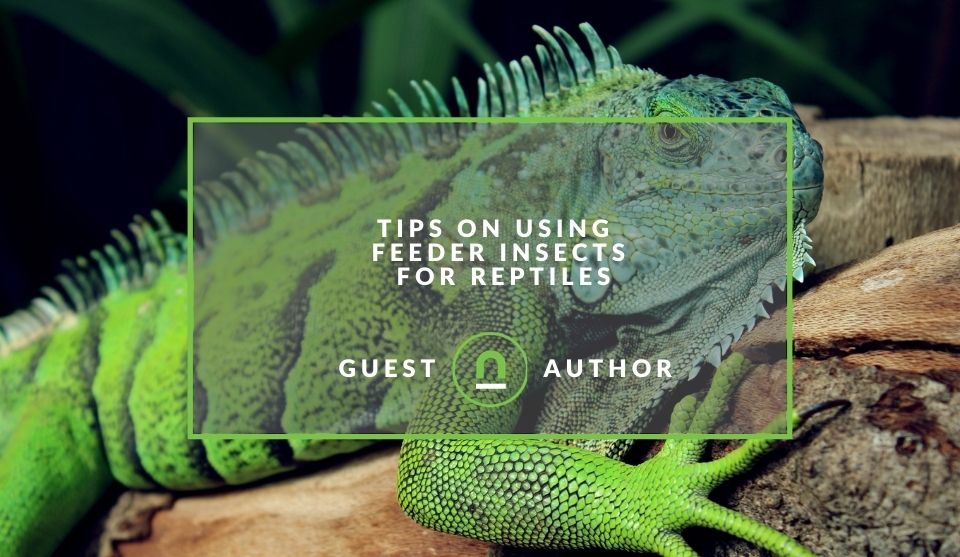Recent posts

Press Releases
Rehab Your Knee: A Free, Evidence-Based Guide to Smarter Recovery
12 February 2026

Money Talks
XRP vs. Stablecoins: Which Is Better for Cross-Border Payments in 2026?
28 January 2026

Press Releases
Sleep Expert Cautioning Against TikTok’s ‘Mouth Taping’ Trend
28 January 2026

Press Releases
Why Vintage Watches Are the Hottest Trend in 2026
27 January 2026
Popular posts
Extravaganza
Trending Music Hashtags To Get Your Posts Noticed
24 August 2018
Geek Chic
How To Fix iPhone/iPad Only Charging In Certain Positions
05 July 2020
Extravaganza
Trending Wedding Hashtags To Get Your Posts Noticed
18 September 2018
Money Talks
How To Find Coupons & Vouchers Online In South Africa
28 March 2019
Tips On Using Feeder Insects for Reptiles
19 May 2021 | 0 comments | Posted by Glenn in Fur, Fins & Feathers
How much do you examine the nutritional information on the labels of foods you consume? You probably pay attention to carbs, protein, fat, and vitamins, depending on your health and dietary goals.
Staying healthy as a person requires paying attention to what you consume and pursuing a well-balanced diet. In the same way, it is necessary to pay attention to what you feed your reptiles for their wellbeing.
Nowadays, many people are keeping reptiles as pets, and if you're one of them, you should get some basic information about feeding your reptile. All reptiles have one thing in common: they all enjoy eating!
Feeder insect suppliers like hornworms can provide nutritious and tasty choices for your pet. You have various feeder insects to choose from when it comes to preparing your reptile's diet.
Let's take a look at the types of feeder insects available to make the best decision for your pet.
What feeder insects do your reptile pets eat?
Pet reptiles tend to choose their feeder insects based on their preferences. Many pet owners want their pets to consume according to their choice so that this food preference can be aggravating. Although most geckos enjoy crickets, they all adore Dubia roaches, which provide excellent nutrition.
It's not just about the taste for your pet reptile; you should also understand food, which necessitates a high-fat, high-protein, high-fibre, and high-calcium diet. The fibre needs of your reptile are fulfilled when you feed them green leafy vegetables.
Crickets as feeder insects
Crickets have long been the most common pet for a variety of reptiles. They're a high-energy live feeder that encourages pets to eat and move about.
Crickets have 70% of your pet reptile's moisture needs, as well as 20% protein and 3% ash. Crickets have the advantage of being inexpensive and readily accessible at most online and offline pet shops. You can easily locate a cricket that is the right size for your pet reptile.
Hornworms
For your pickiest eater, consider hornworms to be the macaroni and cheese for your insects. They're also high in water and great for rehydrating! Sizes range from 12" to 34" in length. They are the best food for leopard geckos, adult bearded dragons, and chameleons.
Dubia Roaches are a great source of nutrition for pet reptiles
Dubia roaches, with a protein content of 22%, are the best choice for your pet reptiles for various reasons. They can't get out of your pet reptiles' enclosure because they're poor climbers. Dubia roaches often have the advantage of not emitting a foul odour like crickets and are easier to rear and sustain. These clean insects, which are equivalent to 7 crickets in mass, are easier to feed your reptiles, and they make excellent feeding choices for larger reptiles.
Mealworms
Mealworms, Superworms, and Giant Mealworms are common choices for feeding chickens and breeding insectivorous birds, but because of their high-fat content and hard exoskeleton, they should only be provided to lizards on special occasions, as too many are thought to cause gut impaction. They can also be used as a reward to encourage a positive feeding response in many pets.
Silkworms
Due to their high protein content, silkworms are an excellent alternative for both reptiles and amphibians. Large fish, birds, lizards, and frogs all have a strong feeding response to their movement. With a high protein content and reasonable calcium to phosphorus ratio, live silkworms grown solely on mulberry leaves are one of the most nutritious options for reptiles. They also have soft exoskeletons, making them easier to absorb and less likely to cause intestinal obstruction.
Waxworms have a lot of fat in them
Waxworms can be fed to your pet reptiles. However, they are high in fat (24%). They have a moisture content of 59% and a protein content of 14%. These thin-skinned insects are easier to feed your pet reptiles, and they're rich in protein and calcium. If your pet reptile is underweight, feeding wax worms regularly will help it gain weight.
Earthworms
Earthworms have very low fat and protein content, making them an excellent treat or diet choice for lizards and frogs. They do need calcium brushing before feeding due to the relatively low calcium to phosphorus ratio.
Is water essential for reptiles?
A common misconception among reptile owners is that reptiles do not need water. Your Pets do need water to survive. Many reptiles, on the other hand, get their moisture from the natural foods they consume. Feeding your pet reptile insects with high moisture content is a smart idea.
What is the best way to keep live feeder insects?
Live feeders have a variety of storage requirements, which should be considered before purchasing. There are a few general rules that apply to all types of live feeders, including:
- Toxins - Live feeders must be held in a well-ventilated environment so that they are not exposed to poisonous fumes like cleaning materials, smoke, or insecticides. Furthermore, any fresh food given to the live feeders should be properly washed to remove any residual insecticides.
- Ventilation - A well-ventilated storage facility and container are important to help keep condensation and moisture at bay, in addition to reducing the possibility of toxic fumes. The health of your live feeders can be jeopardized by high humidity.
- Light - Live feeders must always be kept in the dark, out of direct sunlight area.
To sum it up
Although there are several feeder insect choices for pet reptiles, it is important to check the nutritional content of each kind of insect before feeding it to your reptile.
Tell us your story
Would you like to write for nichemarket just like Glenn has? Find out how to submit a guest post and when you're ready, you can contact us.
Are you looking to promote your business?
South African pet businesses can create your free business listing on nichemarket. The more information you provide about your business, the easier it will be for your customers to find you online.
Registering with nichemarket is easy; all you will need to do is head over to our sign up form and follow the instructions. If you require a more detailed guide on how to create your profile or your listing, then we highly recommend you check out the following articles.
Recommended reading
If you enjoyed this post and have time to spare why not check out these related posts and dive deeper down the rabbit hole that is being a pet owner.
- Using Cannabis Oil for Dogs
- Which Diet Is Best For Your Dog
- Pet-Friendly Campsites In The Western Cape
- Where To Get Pet Insurance In South Africa
- Do's & Don'ts For Keeping Your Pet Safe During Guy Fawkes
- 4 Complete Nutrition and Diet Guides for Your Senior Dog
- Tick-Borne Diseases Pet Owners Should Know About
Tags: Reptiles, Pets, Guest Post
You might also like
Africaworks Accelerates The Rollout Of Real Estate Investment Platform
20 January 2026
Posted by Nicolas Teisserenc in Press Releases
AWIP accelerates the rollout of its urban real estate investment platform in West Africa, raising €4m and fully deploying it into two off-market acqu...
Read more80% of Gen-Zers Would Marry an AI
19 January 2026
Posted by Steph M in Press Releases
Experts reveal why AI relationships are getting serious, and the reasons why 4 in 5 young people are open to marrying ai as human dating becomes too ...
Read more{{comment.sUserName}}
{{comment.iDayLastEdit}} day ago
{{comment.iDayLastEdit}} days ago
 {{blogcategory.sCategoryName}}
{{blogcategory.sCategoryName}}


